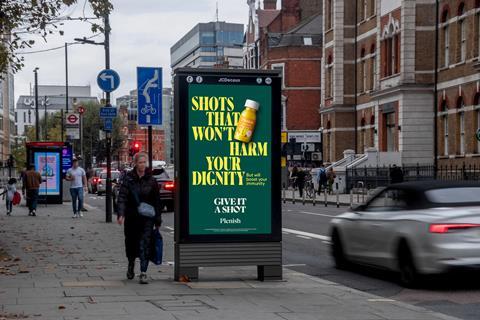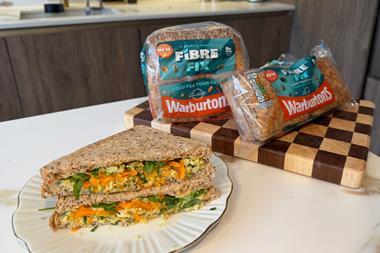
Plenish has come under fire over a “problematic” claim made in a campaign for its functional juice shots.
The brand’s new ‘Give it a shot’ campaign, which rolled out across nationwide OOH advertising, display and paid social media this January, was guilty of exaggerating the health credentials of its shots, freelance nutritionist Claire Baseley said.
Posting on LinkedIn, Baseley said the Plenish campaign – which featured one-liners like “shots that won’t make you text your ex but will boost your vitamin D”, was mostly “legally compliant”.
One ad – however – which claimed Plenish’s shots “won’t harm your dignity but will boost your immunity” was “problematic for several reasons”, she said.
Speaking to The Grocer, Baseley said the strapline overstated the authorised health claim that products high in vitamin C helped contribute “to the normal function of the immune system”.
“Normal immune function does not mean that you’re not going to get sick,” she said. “It means that you’ll get sick and your immune system will fight off the infection in a normal way.”
But “‘boosted immunity’ suggests that you are not going to get sick”, she added. “It’s an exaggeration of the authorised claim wording. It engenders the belief in the consumer that they’re somehow vaccinated.
“It feels quite innocuous, and it feels like a really small change in wording, but it is a big change in meaning.”
Plenish was “not alone” in overstating the health claims of its products, Baseley said. “It’s something that is absolutely prolific, particularly because people are concerned about their immune function post-Covid,” she said.
Nevertheless, “the claim wording was written by scientists to reflect to reflect the evidence”, and therefore needed to be adhered to by suppliers, she added.
‘Disruptive’ campaign
Plenish’s campaign was created by agency Lucky Generals. It used “positive and disruptive language” to encourage consumers to “invest in their wellbeing and upgrade their daily routine” with a juice shot, the Carlsberg Britvic-owned brand said in January.
All claims in the adverts were “in accordance with the nutrition and health claims regulation”, claimed Russell Goldman, managing director for breakthrough brands at Carlsberg Britvic.
“We used a general health claim to convey the overall health benefit (‘boost your immunity’) and, in accordance with the regulation, presented the full authorised health claim on the ad to support this,” Goldman said. “We also stressed the importance of a healthy balanced diet and active lifestyle.”
‘Lack of enforcement’
Regulation of health claims for food advertising is the responsibility of the Advertising Standards Authority (ASA).
In a ruling over social media ads posted by Revival Shots in 2020, the ASA concluded the claim Revival’s products could “boost immunity” was guilty of exaggerating authorised health claims around vitamin C and D. The ads were found in breach of the CAP Code.
Baseley called on the ASA to address what she termed “a massive lack of enforcement” in the regulation of health claims in advertising.
“There are thousands of unauthorised health claims, mainly being made by small brands in and around the cognitive, immune health and gut health space,” she said. “There’s also a lack of awareness around not just the legislation, but what is and isn’t appropriate claim wording.”
Approached for comment, the ASA referred to previously published guidance around food supplements, Covid-19 and the immune system.
“We haven’t received any complaints about this ad and without going through our formal processes, we can’t say whether the claims are a problem under our rules,” a spokeswoman said. “But we encourage anyone who has concerns about an ad they’ve seen to get in touch.”



















No comments yet